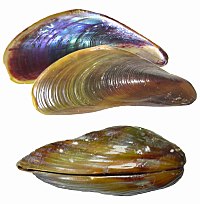
Photo from wikipedia
The failure of depleted bivalve populations to recover naturally is often due to a breakdown in recruitment processes, such as a lack of larvae or suitable settlement substrate. The identification… Click to show full abstract
The failure of depleted bivalve populations to recover naturally is often due to a breakdown in recruitment processes, such as a lack of larvae or suitable settlement substrate. The identification of these recruitment limitations are a critical initial step for determining an appropriate strategy for restoration. A lack of larval supply and settlement substrate have both been suggested as possible causes of the failure of natural recovery in the green‐lipped mussel population in the Hauraki Gulf, New Zealand, and were therefore examined in this study. Larval mussels settled throughout most of the year directly onto artificial collectors placed within restored adult mussel beds and in the immediate vicinity of the beds at comparatively lower levels than for remnant populations throughout New Zealand. This low settlement coupled with a lack of recruitment to the restored mussel beds suggests larval supply may be limited in the Hauraki Gulf and warrants further examinations into larval dispersal and retention. Larval settlement was also higher on collectors within mussel beds, suggesting the presence of adults enhances larval settlement and highlights the importance of transplanting adult mussels for reestablishing mussel populations.
Journal Title: Restoration Ecology
Year Published: 2020
Link to full text (if available)
Share on Social Media: Sign Up to like & get
recommendations!